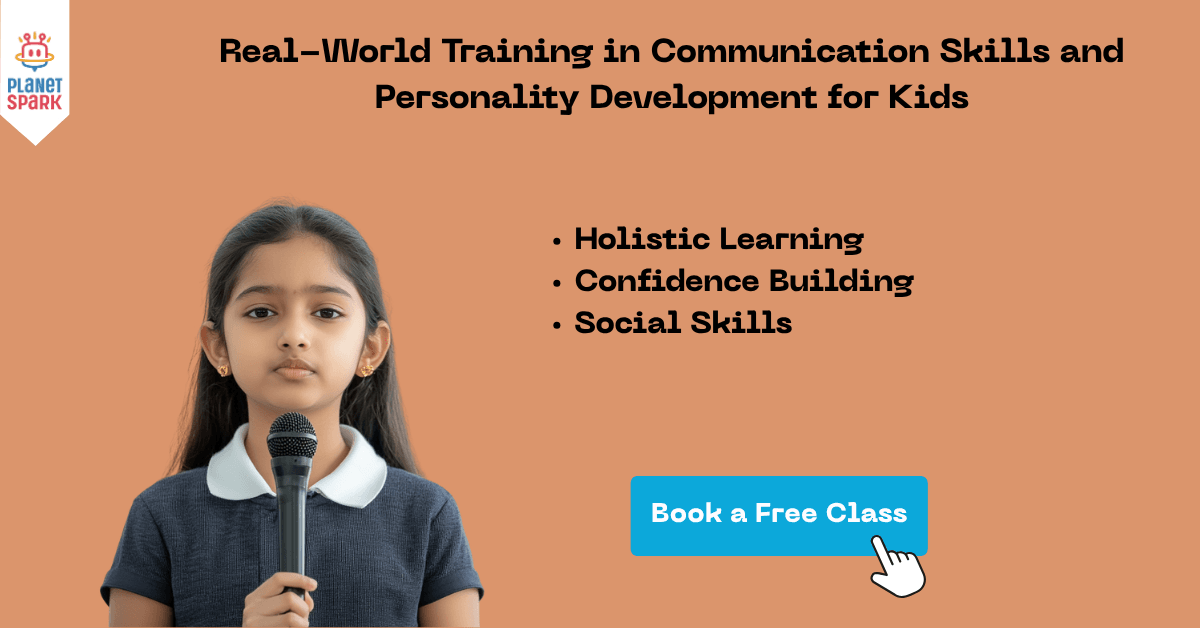5 Effective Communication Skills for Better Connections

Table of Contents
- Active Listening: The Foundation of Effective Communication
- Clarity and Concise Say Less, Mean More
- Non-Verbal Communication: The Silent Language of Impact
- Emotional Intelligence: Communicating with Empathy
- Feedback and Adaptability: The Secret to Continuous Improvem
- Mastering the Art of Effective Communication
- Why Choose PlanetSpark to Build Effective Communication Skil
In a world driven by conversations, clarity and connection can set you apart. Whether you’re speaking on stage, collaborating with your team, or simply expressing your thoughts, effective communication skills play a crucial role in every aspect of life. This blog explores five essential principles of effective communication that help you become a more confident, influential, and empathetic communicator.
Active Listening: The Foundation of Effective Communication
One of the most powerful yet underrated communication principles is active listening. It’s more than just hearing words; it’s about understanding emotions, intentions, and the message behind them. Active listening builds trust and respect between individuals, creating a foundation for authentic dialogue.
An effective communicator listens with intent, not just to respond but to comprehend. When you give full attention to the speaker, maintaining eye contact, avoiding interruptions, and showing empathy, you make the other person feel valued. This skill is vital in leadership, teamwork, teaching, and even personal relationships.
To develop this skill, focus on both verbal and non-verbal cues. For instance, nodding, leaning slightly forward, or paraphrasing what someone said signals attentiveness. You can also ask clarifying questions like “So, what you’re saying is…” to ensure understanding. These small efforts prevent miscommunication and build stronger human connections.

Clarity and Concise Say Less, Mean More
Among all effective communication skills, clarity stands out as the one that transforms good speakers into great ones. Communication is not about using complex vocabulary; it’s about ensuring your message lands effectively. Clarity eliminates confusion and helps your audience grasp your point quickly.
The principle of clarity emphasizes simplicity in expression. Think about how often ideas get lost in long sentences or ambiguous words. An effective communicator organizes their thoughts, chooses precise words, and delivers messages in a structured way. For example, instead of saying, “We might consider possibly changing the plan,” say, “Let’s change the plan.” The latter is direct and leaves no room for doubt.
Concise, on the other hand, is about communicating value in fewer words. In meetings, presentations, or conversations, unnecessary details can dilute your impact. The ability to convey more meaning with fewer words shows confidence and control. You can practice this by summarizing your points before speaking, avoiding filler words like “um” or “you know,” and sticking to the essence of your idea.
When clarity and conciseness combine, your audience not only understands you they remember you. These communication principles ensure your thoughts are delivered effectively, whether in written or spoken form.
Non-Verbal Communication: The Silent Language of Impact
Words matter, but what you don’t say often speaks louder. Non-verbal communication makes up more than 70% of human interaction, and it’s one of the most powerful yet overlooked elements of effective communication. Your gestures, facial expressions, posture, and tone all communicate emotion and attitude.
An effective communicator aligns verbal and non-verbal cues to reinforce their message. Imagine delivering a motivational speech with crossed arms and a blank face—it sends mixed signals. Maintaining open body language, using purposeful hand gestures, and smiling naturally can instantly make you more approachable and credible.
In professional settings, non-verbal communication often determines how your message is received. A firm handshake can convey confidence, while a slight nod can encourage participation. Similarly, maintaining good posture shows attentiveness and respect. The tone of your voice, too, carries emotion ranging from enthusiasm to empathy. A warm, expressive tone can make your message more persuasive.
To improve this skill, observe how others respond to your body language. Record yourself while speaking and notice your gestures and expressions. This practice helps you refine your non-verbal communication and align it with your message for maximum effect.
Don’t let unclear speech hold you back! Master clarity and confidence with personalized public speaking sessions at PlanetSpark.
Emotional Intelligence: Communicating with Empathy
At the heart of all effective communication principles lies emotional intelligence (EI), the ability to understand, manage, and express emotions effectively. Emotionally intelligent communicators don’t just exchange information; they connect on a deeper, human level.
Empathy is the cornerstone of EI. When you can sense and relate to others’ emotions, your communication becomes more meaningful. In a professional setup, leaders who show empathy foster trust, collaboration, and motivation. In personal life, it helps maintain harmony and understanding.
Emotionally intelligent communication involves self-awareness, recognizing how your tone, words, or expressions might affect others. It also includes self-regulation, ensuring emotions don’t overpower logic during critical conversations. The best communicators know when to pause, rephrase, or simply listen.
Developing emotional intelligence takes practice. Engage in conversations with genuine curiosity, reflect on feedback, and practice mindfulness to stay present. These habits not only improve your communication but also your overall relationships and influence.
Feedback and Adaptability: The Secret to Continuous Improvement
An often-overlooked yet vital principle of effective communication is the ability to give and receive feedback. Communication is a two-way process, and feedback ensures that your message was understood as intended. It also helps build relationships based on trust and growth.
An effective communicator doesn’t fear feedback; they invite it. Constructive feedback reveals how others perceive your communication style, tone, and clarity. It helps you refine your approach and avoid recurring mistakes. Equally important is how you provide feedback to others, doing so with empathy, tact, and specific examples ensures it’s well-received and acted upon.
To become adaptable in communication, keep these points in mind:
Listen actively before responding to feedback.
Acknowledge others’ perspectives even when you disagree.
Adjust your communication style depending on your audience; what works for peers may not work for clients or children.
Stay open to learning; great communicators evolve with every conversation.
Adaptability allows you to tailor your message for different contexts, audiences, and emotional tones. This flexibility transforms communication from being routine to being truly effective.
Mastering the Art of Effective Communication
Communication is not just about speaking; it’s about connecting minds and hearts. The five effective communication skills, active listening, clarity, non-verbal communication, emotional intelligence, and adaptability, are the foundation of meaningful interactions. They transform ordinary conversations into opportunities for understanding, collaboration, and leadership.
Mastering these principles of effective communication doesn’t happen overnight—it’s a skill refined through awareness and practice. Each conversation you have is a chance to grow, influence, and inspire. When you communicate effectively, you not only express ideas but also shape perceptions and relationships.

Why Choose PlanetSpark to Build Effective Communication Skills
PlanetSpark is more than just a learning platform; it’s a transformation space for young learners, professionals, and aspiring speakers who want to express with confidence and clarity. With expert mentors, interactive classes, and real-world speaking practice, PlanetSpark helps you evolve into a truly effective communicator.
Here’s why PlanetSpark is the preferred choice:
Personalized Learning Paths: Programs tailored to your goals, be it spoken English, public speaking, or personality development.
Live Interactive Classes: Real-time feedback from experienced communication coaches.
Practical Application: Role-plays, debates, and storytelling sessions to sharpen real-life communication.
Progress Tracking: Continuous evaluation to monitor improvement and growth.
Global Community: Learn and communicate with peers from across the world.
PlanetSpark helps you not just learn English communication but live it. Whether you’re a student preparing for interviews, a professional looking to lead better, or someone simply seeking confidence, the right training can make all the difference.
Ready to unlock your true communication potential? Take the first step toward becoming an influential speaker today!
Join Now and make your child a master of communication skills!
Frequently Asked Questions
Effective communication skills are the abilities that help you express your thoughts clearly, listen actively, and connect meaningfully with others. They include verbal, non-verbal, and emotional communication, which together make your message impactful and easy to understand.
Communication principles form the foundation of meaningful interactions. They guide how we speak, listen, and respond, ensuring that our message is understood without confusion. These principles help build trust, reduce conflict, and create lasting personal and professional relationships.
The five key communication skills include active listening, clarity and conciseness, non-verbal communication, emotional intelligence, and adaptability. These skills together help you convey your message with confidence and empathy in every situation.
To become an effective communicator, practice listening more than you speak, express thoughts clearly, maintain positive body language, and seek feedback regularly. Continuous learning and real-world practice are crucial to building confidence and natural communication flow.
Emotional intelligence enhances communication by helping you recognize and manage emotions, both yours and others’. It allows you to respond calmly in conflicts, empathize with others’ perspectives, and create deeper, more meaningful conversations based on understanding and respect.
Personalized Communication Report
Record a video to get a AI generated personalized communication report for your child

Hi There, want to try these
tips for your child with
LIVE with our expert coach?
Let's check your child's
English fluency
